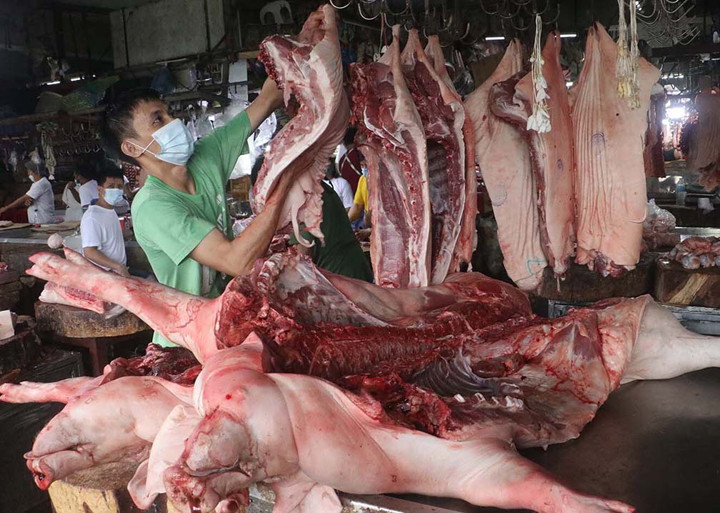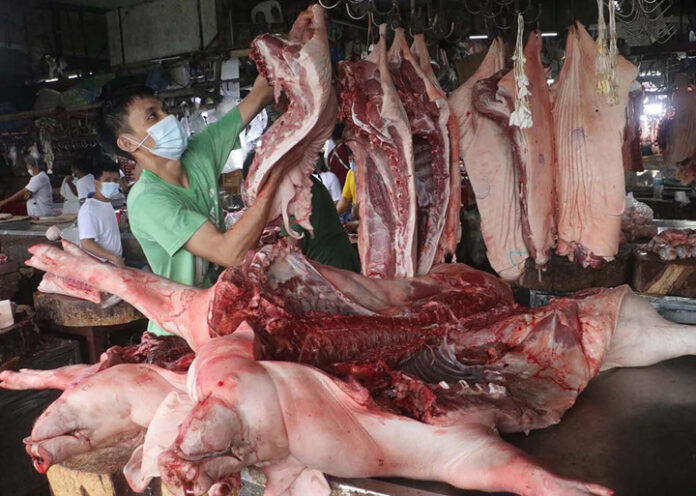
The ongoing debate on the Duterte administration’s pork tariff reduction and proposed minimum access volume (MAV) is casting uncertainty over importers’ purchase intentions abroad, an industry group said.
The Meat Importers and Traders Association (Mita) said the recent discussion between senators and government officials on whether the pork tariff reduction must be rescinded along with the proposed MAV plus is “resulting in hesitancy on the part of importers.”
“The implication of this uncertainty is causing hesitancy on the part of importers, especially that there are several factors working this time,” Mita President Jesus C. Cham told the BusinessMirror.
The Senate Committee on the Whole hearing last Tuesday saw senators pushing for a compromise with the economic managers, led by Finance Secretary Carlos G. Dominguez III, on the twin pork proposals of the Executive branch.
Dominguez, for his part, disclosed that their “minds are not closed” on alternative solutions to rising pork prices and worsening domestic shortage.
President Duterte earlier appealed to lawmakers to give Executive Order (EO) 128, which lowered pork tariffs, at least two months before they push for its withdrawal.
EO 128 cut pork tariffs to 5 percent for in-quota imports and to 15 percent for out-quota imports for the first three months of the measure, or until July 8. Afterwards, both tariff rates would increase by 5 percent for the next 9 months before it reverts to its 30 percent (in-quota) and 40 (out-quota) percent levels.
Cham said if a compromise will be made between the lawmakers and economic managers, then it should only affect the rates for the last nine months of EO 128.
“Do not touch the [rates for the first three months] anymore. Keep them at those rates. If they are going to come up with a compromise, then it should affect the rates for the last 9 months,” he said.
“So preferably we do not cut the tariff rates for the first three months so we have some certainty,” he added.
Furthermore, Cham said the concerns over the implementation of the MAV plus is also adding uncertainty on how importers’ place new orders on top of the problems brought about by the persisting global trade imbalance. President Duterte recommended to Congress to increase the pork MAV by 350,000 metric tons last March 26.
“The shortage of containers has already delayed our arrivals. Our pending orders are not arriving as scheduled, so this also affects the trade flows and the cash flows of the importers, thus, affecting his decision to make new orders,” he said.
“And then you have the uncertainty over the MAV plus, to place new orders. It is up to each individual how they are going to hedge now,” he added.
The question on when Duterte’s MAV plus proposal would be effective also took the spotlight in the recent Senate Committee of the Whole hearing, with senators and government officials having different views on the matter.
For one, Agriculture Secretary William D. Dar believes that the MAV Plus will take effect once an EO is issued by Duterte regarding the matter, since the 15-day deadline for Congress to act on the proposal has lapsed already.
“I go for that view that once it lapsed for 15 days then the Executive department can issue an EO implementing the MAV plus,” Dar said.
But Senate Minority Leader Franklin M. Drilon had a different view about the matter. Since the MAV Plus recommendation was submitted by President Duterte to Congress on March 26, the day that both chambers adjourned their session for a scheduled recess until May 16, the lawmakers did not have the opportunity to act on the proposal, Drilon said.
He pointed out that the existing law governing the MAV Plus assumes that Congress has the capacity to act on a recommendation made by the President.
“What is the use of giving Congress 15 days to review the recommendation if after 15 days, even [if] Congress is not in session, that proposal is approved? You are making a mockery of this rule,” he said.
Senate President Vicente Sotto III supported Drilon’s position on the legal issues surrounding the recent MAV Plus proposal, pointing out that the executive branch could face possible legal implications if they push through with the increase of MAV through an EO.
“There is a big difference between ‘did not’ act and ‘cannot’ act. The law states that [the proposal is approved] if Congress after receiving it [proposal] did not act on it. But that’s not the case here. The proposal was sent to us while we cannot act on it,” Sotto said.
Due to this, Drilon said the 15-day deadline stipulated by Republic Act 8178 (RA) on MAV Plus mechanism would only start on May 17, when Congress resumes session.
“My position is that there shall be no increase in the MAV. It can only be effective until after 15 days of May 17, assuming we do not act on it. The law is very clear,” he added.
Read full article on BusinessMirror

